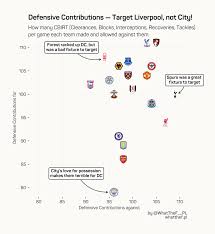Understanding Defensive Contributions in Fantasy Premier League (FPL)

The Importance of Defensive Contributions in FPL
In Fantasy Premier League (FPL), players often focus on high-scoring forwards and midfielders, but defensive contributions are equally crucial for maximising points. The performance of defenders can significantly influence overall team scores, making it essential for managers to recognise the value of defensive players.
Recent Trends and Statistics
As of the current 2023 season, there has been a noticeable shift in the ways that FPL managers construct their teams. With an increasing emphasis on tactical formations from clubs like Manchester City and Liverpool, defenders have started to play more attacking roles. For instance, Manchester City’s Joao Cancelo has frequently registered assists and even goals, thereby providing immense value for the FPL managers who included him in their squads.
According to the latest stats, players such as Kieran Trippier and Trent Alexander-Arnold have amassed significant points through their contributions not just in defence but also in set-pieces and assists. In fact, Trippier has averaged over 5 points per game this season, with five assists and a couple of clean sheets boosting his total.
Evaluating Defensive Players
When selecting players for defensive spots, FPL managers should consider multiple factors, including the team’s defensive strength, the individual player’s involvement in attack, and the fixtures at hand. Defensive contributions include clean sheets, tackles, interceptions, and bonus points received for stellar defensive work. Understanding the interplay between these variables can provide managers with an edge.
Analysts often suggest picking defenders from teams that not only defend well but also possess the capability to contribute to attacking plays. For example, Brighton’s defence has shown remarkable resilience, and players like Lewis Dunk can rack up points through both clean sheets and potential goals from set-pieces.
The Role of Data Analytics
As we advance further into this FPL season, the use of data analytics is becoming increasingly prevalent among managers. Websites and applications provide insights into player performances and can help predict potential clean sheets and attacking contributions. Tools analysing defensive contributions enable players to make informed decisions when it comes to transfers and captaincy choices.
Conclusion
In summary, while attacking players tend to dominate points in FPL, defensive contributions should not be overlooked. As teams adjust strategies and formations, savvy managers can take advantage of defenders who contribute offensively while still maintaining their defensive duties. As the season progresses, monitoring key players based on their role within their respective teams can significantly enhance FPL outcomes. Ultimately, understanding the importance of defensive contributions could be the cornerstone of a successful fantasy football campaign.
You may also like

Cardiff City vs AFC Wimbledon: Key Insights and Match Preview

Understanding United Fixtures: Trends and Developments
Understanding the NFL Playoff Picture for 2023
SEARCH
LAST NEWS
- Remembering Wendy Richard: The Promise to Co-Star Natalie Cassidy
- How Did Anglian Water Achieve an ‘Essentials’ Rating for Mental Health Accessibility?
- Shai Hope Leads West Indies in T20 World Cup Clash Against South Africa
- What We Know About Weston McKennie: Future at Juventus and Past at Leeds
- What We Know About the Upcoming Live Nation Antitrust Trial